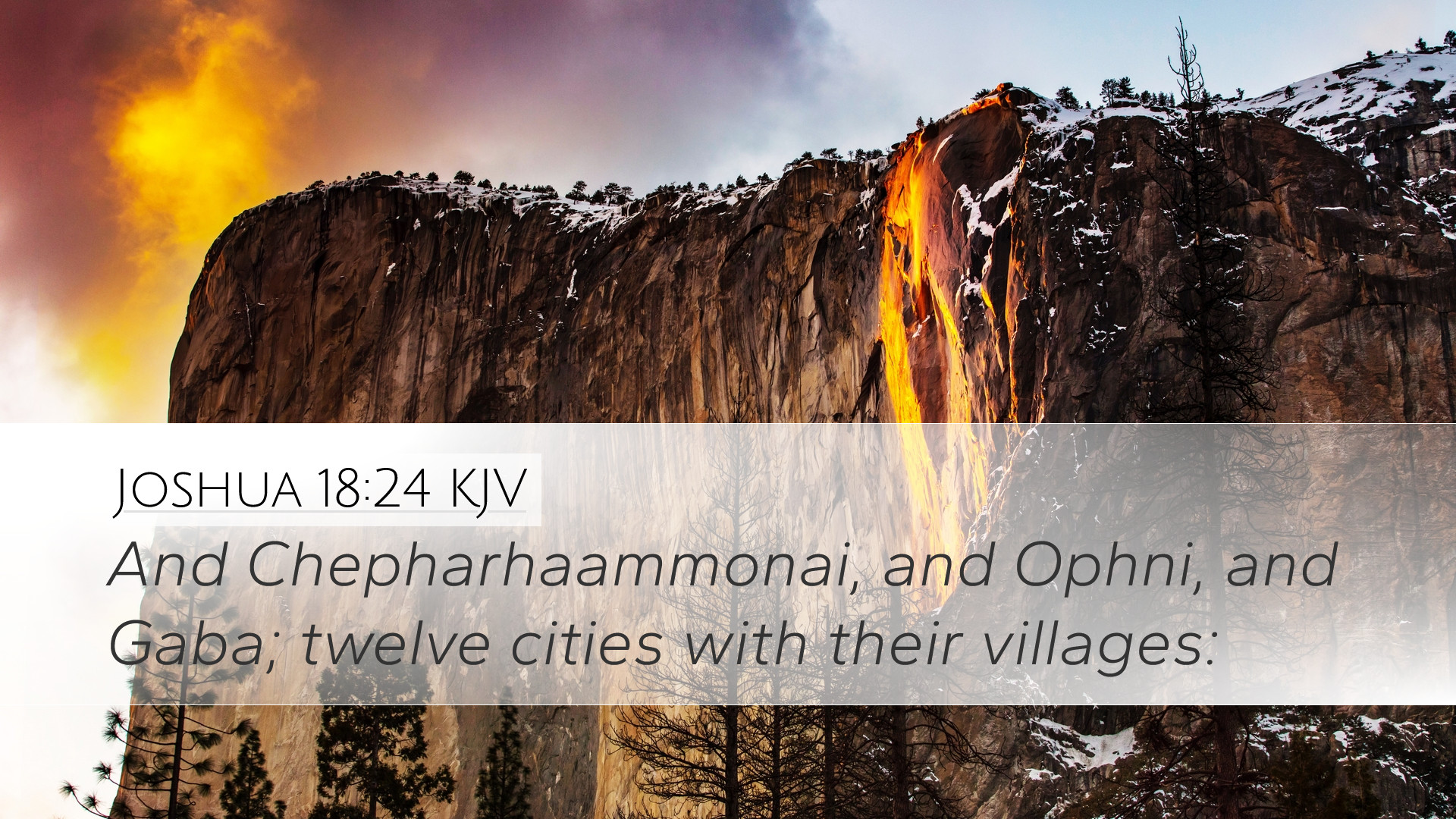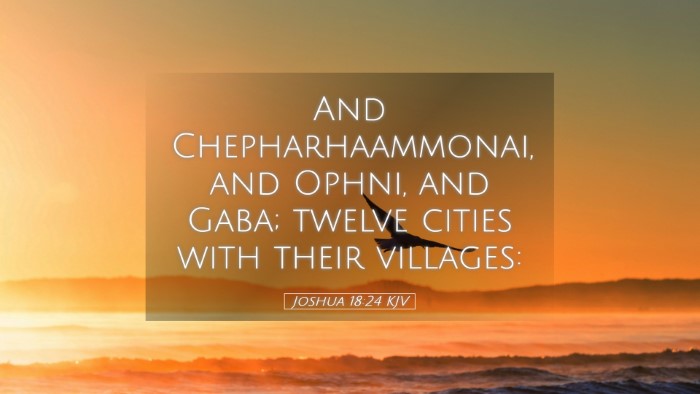Commentary on Joshua 18:24
Joshua 18:24 states: "And Gid, and Ahio, and Ihi, and Phinehas the son of Eleazar the priest, and all the children of the Gibeonites, were with him." This verse touches on the tribal allocations of the land, specifically pertaining to the portion of the tribe of Ephraim. The listing of names and roles indicates significant involvement in both leadership and ceremonial practices. Below is a synthesis of insights derived from various public domain commentaries, particularly those of Matthew Henry, Albert Barnes, and Adam Clarke.
Contextual Overview
The passage occurs during a transitional phase in Israel’s history, as they settle into the Promised Land after years of wandering. Each tribe received specific allocations of land, and the process involved detailed and often public proceedings to ensure fairness and divine alignment in the distribution. This verse highlights the roles individuals played in this important milestone, illustrating the organized governance of the Israelite community.
Insights from Public Domain Commentaries
Matthew Henry's Commentary
Community and Divine Order: Henry emphasizes the importance of community representation. By listing figures such as Phinehas, who was a priestly figure, the verse conveys how spiritual leadership was intimately involved in civic matters. This coordination of sacred and secular authorities highlights the theme of divine providence guiding the destiny of Israel.
Significance of Names: The names mentioned (Gid, Ahio, Ihi) serve to connect the historical narrative to actual community leaders. Their inclusion serves a dual purpose of historical record and honoring previous leaders whose roles would influence the future generation. Recognition of these names invites reflection on the legacy of leadership within faith communities.
Albert Barnes' Notes
Geographical Context: Barnes delves into the geographical implications of the verse. He notes that this specific allocation reflected the larger strategic planning that characterized Joshua’s leadership. The careful delineation of tribes and their respective lands signifies a harmonious balance maintained in the distribution of territories, which was vital for ensuring stability among the tribes of Israel.
Priestly Involvement: The mention of Phinehas is significant in establishing the connection between civil and religious governance. As a descendant of Aaron, Phinehas exemplifies how spiritual leaders played crucial roles in critical decisions of the nation. Barnes indicates that this partnership was foundational for establishing the nation's identity, especially as they transitioned into a more settled and structured society.
Adam Clarke's Commentary
Cultural Significance: Clarke offers a deeper exploration of the cultural aspects within the names presented. He notes that the inclusion of various leaders, especially Gibeonites, signifies the blend of cultures within the growing nation of Israel. It highlights the necessity of unity among diverse backgrounds, promoting a culture of inclusiveness amidst the Israelite community's transformation into a nation.
Reflection on Leadership: Emphasizing the leadership roles assigned in this verse, Clarke urges readers to reflect on the qualities of those in positions of authority. The faithful fulfillment of responsibilities by these leaders serves as a crucial lesson for contemporary pastoral duties. Their commitment serves as a model for modern leaders, calling for integrity, spiritual adherence, and a deep understanding of community needs.
Theological Implications
The implications of this verse extend beyond mere historical narrative. The intersection of leadership, community, and divine ordination is a central theme that resonates within the Christian faith. The acknowledgment of priestly roles in societal governance models how faith should inform and guide civic responsibilities. Given the contemporary Christian landscape, this intersection inspires a theological reflection on how modern faith communities navigate similar complexities.
Application for Pastors and Theologians
This verse, juxtaposed with the commentaries, serves as a rich resource for pastors and theologians as they seek to understand the dynamics of community leadership and divine guidance. Here are some contemplations and applications:
- Integration of Faith and Leadership: Pastors can explore how their spiritual roles influence the governance within their communities, reflecting on the imperative of combining faith with civic duty.
- Legacy of Leadership: The examination of leaders within this passage can motivate contemporary leaders to evaluate their own legacy and the impact they have on future generations.
- Embracing Diversity: Learning from Clarke’s insights encourages communities to celebrate diversity and create environments where all backgrounds contribute to the faith community.
Conclusion
Joshua 18:24 encapsulates a moment of communal and spiritual significance within Israel's history. Through various commentaries, it is clear that the roles of leadership, the intermingling of community narratives, and the governance of divine principles play pivotal roles in shaping the identity of a nation. For pastors, scholars, and students of the Bible, this verse serves as both a historical lesson and a contemporary call to embody the integration of faith within societal frameworks.


